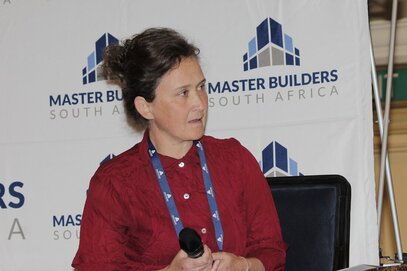The ASAQS addresses late- and non-payment by national, provincial and municipal government19/9/2019 Photo: Christelle Bown, President of the ASAQS
A recent survey by the Association of South African Quantity Surveyors (ASAQS) shows that the majority of Quantity Surveyors experience late- or non-payment of contractors on national, provincial and municipal projects. ASAQS President Christelle Bown presented the survey findings during a panel discussion at the 2019 Master Builders Annual Congress, which was held on 9 September in Johannesburg. “Over 140 ASAQS members participated in the survey, with the majority of respondents saying they experience late and non-payment on government projects. The Minister of Public Works and Infrastructure, Patricia de Lille, recently said that her department had paid R106-million in outstanding invoices. While this is a step in the right direction, it is still only a drop in the ocean of the R6-billion of government debt, that needs to be paid to contractors and professionals in the built environment,” says Bown. The survey also highlighted that the Eastern Cape and Gauteng were the provinces where their members experience the most payment-related problems from government entities. “The Department of Public Works and Infrastructure isn’t responsible for the entire R6-billion in outstanding payments. Finding the sources of all the outstanding debt and addressing it with the appropriate departments and implementing agents will require a collaborative approach from built environment stakeholders,” says Bown. Accounting for violence and disruption on projects Another issue that was addressed during the panel discussion was how Quantity Surveyors should account for the community facilitation and safety measures that are needed to combat the ongoing violence and intimidation that has plagued many infrastructure projects in the country. There is a provision for a Community Liaison Officer in the bill of quantities for government projects. A possible solution could be the addition of a Social and Community Facilitator consulting role, which would be an additional cost to the client but could potentially minimise the cost of delays and damages from the construction mafia and other illegal activities on project sites,” says Bown. Closer collaboration needed On 1 August, the ASAQS and MBSA signed a Memorandum of Understanding (MoU) to work more closely together to address challenges in the local construction sector. The recently held Congress cemented this sentiment, with members of the ASAQS and the MBSA committing to working more closely together in future. “It is vitally important that the many stakeholders in the built environment continue with their current attitude of sincere and meaningful collaboration. These engagements create a platform that allows us to address the diverse and multi-faceted issues that our industry faces from a position of commonality. By keeping each other informed these stakeholder engagements can prioritise the central issues that are common to us all and simultaneously create action plans that deliver viable and sustainable solutions,” says Bown. She concludes by encouraging ASAQS members to participate in upcoming surveys and she compels other built environment professionals to do the same. “Input from different role players can help shed light on the backlog of outstanding payments for government projects. The ASAQS will continue to contribute to meaningful dialogue surrounding these issues. We endeavour to make a change for the better.” ENDS MEDIA CONTACT: Stephné du Toit, 084 587 9933, [email protected] For more information on ASAQS please visit: Website: www.asaqs.co.za Facebook: The Association of South African Quantity Surveyors
0 Comments
Leave a Reply. |
Archives
July 2024
Categories
All
|


 RSS Feed
RSS Feed